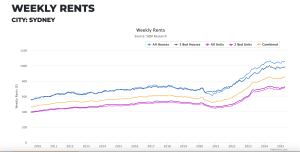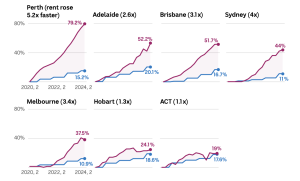Genre:
News Commentary
Story and Angle:
This commentary will explore how COVID-19 has left a deep and lasting imprint on Sydney’s rental housing landscape. While lockdowns are long over, the pandemic has restructured the market in ways that continue to affect thousands of renters — from supply shortages and rent surges to weakened tenant rights and a cultural shift around housing expectations.
The pandemic was not the sole cause of Sydney’s rental crisis — it was an accelerant. In the post-COVID era, renters are paying the real price of recovery, while housing has become more unstable, unaffordable, and unequal than ever before.
Background
Since the COVID-19, capital city rents have risen up to five times faster than incomes. And in Sydney, rental prices have increased rapidly and significantly during and after the pandemic. While lockdowns caused a short-term dip, the long-term result has been a deepening rental crisis driven by low supply, high demand, and weak protections. These developments highlight the urgent need to examine the long-term impacts of the pandemic on housing affordability.


Target Publication:
ABC News
This publication is a trusted national platform. Its online journalism stands out for clear data visualisation, interactive storytelling, and wide digital reach. Its broad audience makes it the ideal outlet for a story that connects housing stress with national recovery.
Target Audience:
The target audience for this story includes young renters (aged 18–40), students, and early-career professionals who have been directly impacted by Sydney’s post-pandemic rental crisis. Additionally, the story appeals to socially engaged readers—such as housing advocates, policy watchers.
Interview Subjects & Sample Questions
1. Young Renters
-
How many times did you have to move during the pandemic? What was the biggest challenge you faced at the time? Has your living situation become more stable since then?
2. Long-Term Rental Agents
-
During the pandemic, did you observe major shifts in the rental market? What changes stood out to you the most?
3. MPs / Housing Policy Officials
-
How do you respond to the criticism that the government failed to intervene adequately in the rental market after the pandemic?
Source Material
- ABC News (Apr 2025):
Capital city rents have increased up to five times faster than incomes since the pandemic. -
Rent.com.au (Jan 2025):
Sydney’s median weekly rent for apartments rose to $720, reflecting continued pressure on urban renters.
-
The Guardian (Jan 2025):
A CoreLogic report reveals that since the onset of COVID-19, rents in Australia have surged by 36.1%. -
“The Impact of COVID-19 on Australia’s Private Rental Sector”:
(AHURI, October 2022)
Though published earlier, this research provides in-depth insights into how the pandemic reshaped Australia’s rental sector. - Instagram – #RentersRights
Pay attention to the label of tenants’ rights and interests.
Multimedia, Hypertext & Interactivity
-
Mini video profile or photos to highlight the situation of renters impacted by COVID-era and post-pandemic housing changes.
-
“Then vs Now” slider tool comparing 2020 vs 2025 median rents by suburb to visualise the rental rebound.
-
Expandable quotes from experts or tenants, letting users engage with deeper insights without cluttering the page.
-
User-generated content via Instagram or X, integrating real social media posts or short submitted testimonials.

This is a news commentary proposal with high news value. It has timeliness and proximity. This is an ongoing serious problem. Your news commentary has a good narrative that combines structural problems (rising rents) with individual experiences (tenants’ moving experiences). And the interviewees you proposed are also very comprehensive.
My suggestion is that you can add more data, such as statistics on the number of people who are “forced to move” and mobility data. This can strengthen the argument of “housing instability”. For online writing techniques, I suggest that you can make a short video, such as “3-minute rental story”, following young renters and experiencing their rental process.